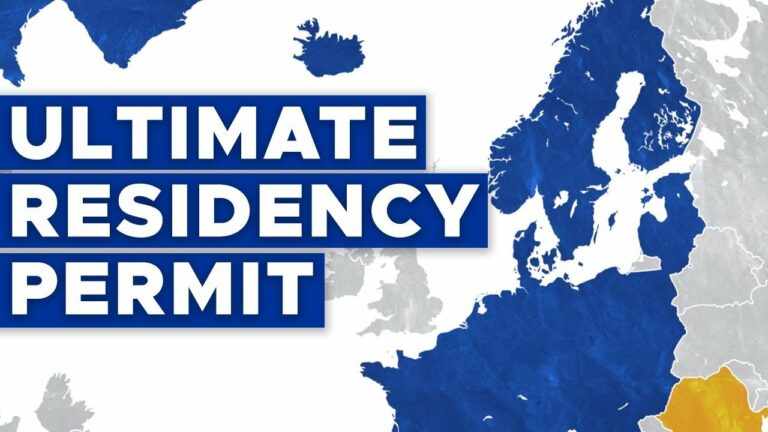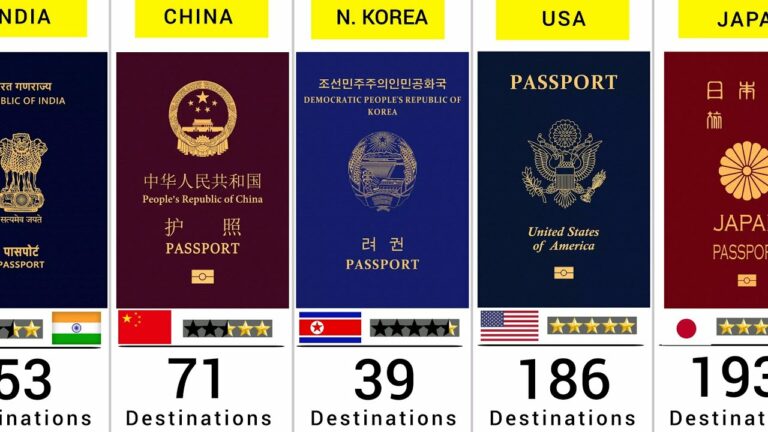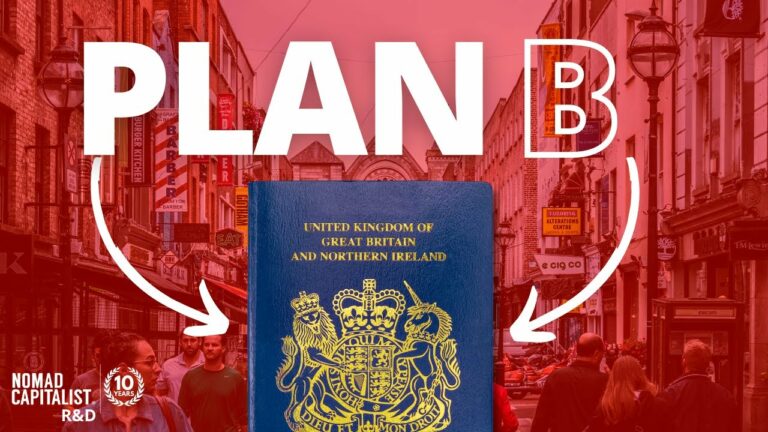Citizenship: Golden Visas & Ancestry – goldenvisareviews.com
Have you ever wondered if you could obtain citizenship in a country you have always dreamed of living in simply through your ancestry? It might seem like a far-fetched idea, but it is entirely possible. As a seasoned expat who has lived in multiple destinations around the world, I can attest to the benefits of having a second citizenship, from visa-free travel to job opportunities and even tax benefits.
In fact, I was able to obtain Italian citizenship through my grandfather, who was born in Italy. It was a lengthy and sometimes frustrating process, but in the end, it was worth it. Having dual citizenship has opened up a world of possibilities for me, including the ability to live and work in the European Union.
But how can you go about obtaining citizenship through ancestry? It’s not as simple as just proving that your great-grandmother was born in a certain country. Each country has its own set of rules and regulations, and the process can be quite complex. However, with the right guidance and resources, it can be a viable option for those looking to expand their horizons and gain a second citizenship.
Throughout this guide, I will provide practical tips and insights on how to obtain citizenship through ancestry, drawing from my own personal experiences and research. From researching your genealogy to navigating the legal requirements, I will offer a comprehensive guide to this unique and exciting pathway to citizenship. So, let’s dive in and explore the world of ancestry citizenship.
Can you use ancestry to get citizenship?
If you are interested in obtaining citizenship in a foreign country, you may be wondering if your ancestry could help you achieve that goal. The answer is yes, in some cases. Many countries offer citizenship by descent, which means that if you have a certain ancestry, you may be eligible to become a citizen of that country.
What is citizenship by descent?
Citizenship by descent is a type of citizenship that is acquired through a person’s ancestry or ethnicity. This means that if you have a parent or grandparent who was a citizen of a given country, you may be able to obtain citizenship in that country as well. Citizenship by descent is also known as jus sanguinis, a Latin term that means “right of blood”.
Which countries offer citizenship by descent?
The countries that offer citizenship by descent vary depending on their respective citizenship laws. However, some of the most well-known countries that offer citizenship by descent include Ireland, Italy, Poland, Greece, Israel and Germany. Each country has its own set of rules and requirements that you must meet in order to be eligible for citizenship by descent.
What are the requirements for citizenship by descent?
The requirements for citizenship by descent vary depending on the country you are interested in. Typically, you will need to prove that you have a direct bloodline to a citizen of that country. This can be done by providing birth certificates, marriage certificates, and other legal documentation. You may also need to provide proof that your ancestors maintained their citizenship in that country, such as tax records or military service records.
How can I apply for citizenship by descent?
In order to apply for citizenship by descent, you will need to research the specific requirements and laws of the country you are interested in. You may also need to hire a lawyer or immigration specialist to help you navigate the application process. Once you have gathered all the necessary documentation and information, you can submit your application to the appropriate authorities. The process can take several months or even years, so it is important to be patient and persistent.
What is the easiest country to get citizenship by ancestry?
Are you thinking about obtaining citizenship through ancestry? It’s a great option if you have a strong connection to your cultural heritage and want to explore the benefits of dual citizenship. However, the process can be complicated and time-consuming, especially if you’re not sure which country is the easiest to get citizenship through ancestry.
What is Citizenship by Ancestry?
Citizenship by ancestry, also known as jus sanguinis, allows individuals to claim citizenship in a particular country based on their family lineage, rather than by birth or naturalization. The eligibility criteria for citizenship by ancestry vary from country to country, but in general, you need to prove that you have a direct bloodline to a citizen of that country.
Which Country is the Easiest to Get Citizenship by Ancestry?
While the eligibility criteria for citizenship by ancestry vary by country, some countries have more lenient requirements than others. Here are some of the easiest countries to get citizenship by ancestry:
- Ireland: If one of your grandparents was an Irish citizen, you are eligible for Irish citizenship by descent. You can apply for Irish citizenship through the Irish embassy in your home country or through the Irish Naturalization and Immigration Service.
- Italy: If your ancestors were Italian citizens at the time of your birth, you may be eligible for Italian citizenship by descent. You’ll need to provide necessary documents and meet certain requirements, such as proving your lineage through birth certificates.
- Poland: If you have Polish ancestry, you may be eligible for Polish citizenship. You’ll need to provide documents, such as birth certificates, marriage certificates, and death certificates, to prove your lineage.
- Germany: If your parents or grandparents were German citizens, you may be eligible for German citizenship. You’ll need to provide necessary documents and meet certain requirements, such as proving your lineage through birth certificates.
Practical Advice for Obtaining Citizenship through Ancestry
While obtaining citizenship through ancestry can be a great way to connect with your cultural heritage, it’s important to be aware of the challenges and complexities of the process. Here are some practical tips to keep in mind:
- Do your research: Before pursuing citizenship through ancestry, research the eligibility requirements and application process for the country in question. Make sure you have all the necessary documents and that you understand the timeline and costs involved.
- Get help from a professional: If you’re unsure about the process or need help navigating the requirements, consider hiring a professional immigration lawyer or consultant who specializes in citizenship by ancestry.
- Be patient: The process of obtaining citizenship through ancestry can be lengthy, so be prepared to wait and be patient. Keep in mind that the benefits of dual citizenship can be well worth the effort in the end.
What do you need for citizenship by descent?
If you’re looking to obtain citizenship through ancestry, also known as citizenship by descent, it’s important to understand the requirements and necessary documents. This process can be complex and varies by country, but with the right preparation and guidance, it can be a feasible way to gain citizenship in your ancestral homeland. Here are some key things you’ll need to consider:
Proof of ancestry
The first step in obtaining citizenship through ancestry is proving your lineage. You’ll need to provide official birth certificates, marriage certificates, and other relevant documents that establish a direct bloodline connection between you and your ancestor who held citizenship in the target country. This can be challenging if your family’s records have been lost or destroyed, but there are often alternative documents that can be used, such as census records or religious documents.
Language proficiency
Many countries require that applicants for citizenship through ancestry demonstrate proficiency in the local language. This can be a barrier for some people, particularly if you have no prior knowledge of the language. However, there are often ways to get around this requirement, such as taking language classes or hiring a translator to assist you.
Residency requirements
Some countries require that applicants for citizenship through ancestry live in the country for a certain period of time before they can apply. This can range from a few months to several years, depending on the country’s laws. It’s important to research and understand these requirements before beginning the application process.
Legal documentation
In addition to proof of ancestry, you’ll need to provide a variety of legal documents to support your application for citizenship through ancestry. This can include police clearance certificates, medical certificates, and financial records. It’s important to ensure that all of your documents are up-to-date and accurate, as any discrepancies can cause delays or even rejection of your application.
Patience and persistence
The process of obtaining citizenship through ancestry can be lengthy and frustrating at times. It’s important to be patient and persistent, as it may take several months or even years to complete all of the necessary steps. However, the rewards of gaining citizenship in your ancestral homeland can be well worth the effort.
By understanding the requirements and necessary documents, as well as being patient and persistent, you can successfully navigate the process and achieve your goal of becoming a citizen of your ancestral country.
Can you get European citizenship through your ancestry or descent?
Are you dreaming of living in Europe and experiencing its diverse cultures and lifestyles? If you have European ancestry or descent, you may be one step closer to making your dream a reality. Europe offers various citizenship programs that allow individuals to claim citizenship based on their ancestry or descent. In this article, we will explore how to get citizenship through ancestry and what you need to know to achieve your goal.
What is ancestry or descent?
Ancestry or descent refers to your lineage and the heritage of your family. If one of your parents or grandparents was born in a country, you may be eligible for citizenship in that country. This is because many countries offer citizenship by descent, which means that if you can prove your ancestry, you can claim citizenship.
What are the benefits of citizenship through ancestry?
The benefits of citizenship through ancestry are numerous. Firstly, it allows you to establish a connection with your ancestral country, which can be an enriching and fulfilling experience. Secondly, it provides you with the right to live, work, and study in the country without any restrictions. Additionally, it gives you access to essential services such as healthcare, education, and social welfare. Lastly, it allows you to travel freely within the European Union and other countries that have agreements with the country of your citizenship.
Which European countries offer citizenship through ancestry?
Many European countries offer citizenship through ancestry, including Italy, Ireland, Germany, Greece, Hungary, Poland, and Lithuania, to name a few. Each country has its specific requirements and procedures, so it’s essential to research thoroughly to determine which country offers the best options for you.
What are the requirements for citizenship through ancestry?
The requirements for citizenship through ancestry vary depending on the country. However, some common requirements include proving your lineage, providing copies of vital records such as birth and marriage certificates, and demonstrating knowledge of the country’s language and culture. Some countries also require you to renounce your current citizenship or pass a citizenship test.
How can I apply for citizenship through ancestry?
The process of applying for citizenship through ancestry can be complex and time-consuming. However, with careful planning and research, you can navigate the process successfully. It’s essential to consult with an immigration lawyer who can guide you through the process and ensure that you meet all the requirements.
exploring your ancestry can be an exciting and rewarding journey that leads to obtaining a second citizenship. With a deep understanding of local customs, cultural events, investment opportunities, and the legal aspects of visas, citizenship programs, and golden visas, there are many opportunities and pathways to obtain citizenship through ancestry. It is important to do thorough research and work with professionals to ensure a successful application process. Obtaining a second citizenship not only provides travel and business opportunities, but also a sense of connection and belonging to a rich cultural heritage. Embracing your ancestry and obtaining a second citizenship can truly enhance and enrich expat life.





